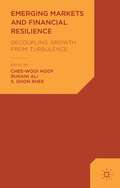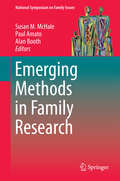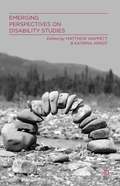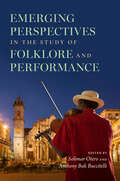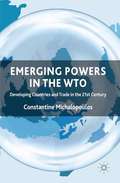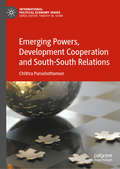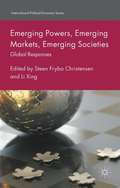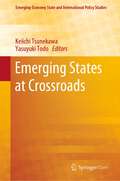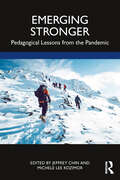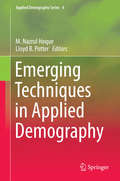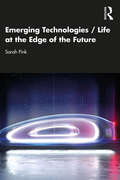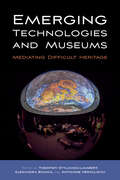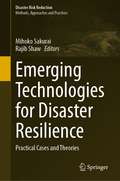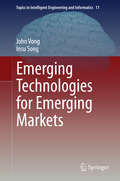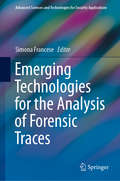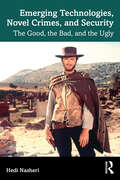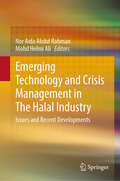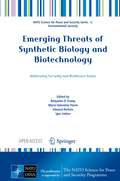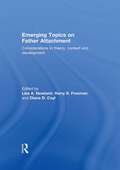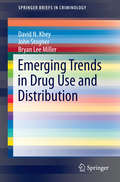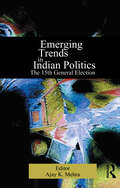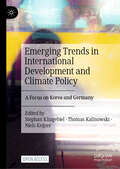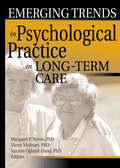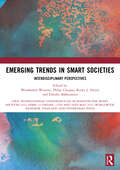- Table View
- List View
Emerging Markets And Financial Resilience: Decoupling Growth From Turbulence
by Chee-Wooi Hooy Ruhani Ali S. Ghon RheeEmerging Markets and Financial Resilience presents a picture of finance research. The issue of financial resilience in emerging markets is apt and timely as emerging countries are faced with the challenge of finding ways of sustaining their current trajectory in shaping the global financial architecture to ensure sustainable growth.
Emerging Methods in Family Research
by Alan Booth Susan M. Mchale Paul AmatoThe family can be a model of loving support, a crucible of pathology, or some blend of the two. Across disciplines, it is also the basic unit for studying human relationships, patterns of behavior, and influence on individuals and society. As family structures evolve and challenge previous societal norms, new means are required for understanding their dynamics, and for improving family interventions and policies. Emerging Methods in Family Research details innovative approaches designed to keep researchers apace with the diversity and complexities of today's families. This versatile idea-book offers meaningful new ways to represent multiple forms of diversity in family structure and process, cutting-edge updates to family systems models and measurement methods, and guidance on the research process, from designing projects to analyzing findings. These chapters provide not only new frameworks for basic research on families, but also prime examples of their practical use in intervention and policy studies. Contributors also consider the similarities and differences between the study of individuals and the study of family relationships and systems. Included in the coverage: Use of nonlinear dynamic models to study families as coordinated symbiotic systems. Use of network models for understanding change and diversity in the formal structure of American families. Representing trends and moment-to-moment variability in dyadic and family processes using state-space modeling techniques. Why qualitative and ethnographic methods are essential for understanding family life. Methods in multi-site trials of family-based interventions. Implementing the Multiphase Optimization Strategy (MOST) to analyze the effects of family interventions. Researchers in human development, family studies, clinical and developmental psychology, social psychology, sociology, anthropology, and social welfare as well as public policy researchers will welcome Emerging Methods in Family Research as a resource to inspire novel approaches to studying families.
Emerging Perspectives On Disability Studies
by Matthew Wappett Katrina ArndtEmerging Perspectives on Disability Studies brings together up-and-coming scholars whose works expand disability studies into new interdisciplinary contexts. This includes new perspectives on disability identity; historical constructions of (dis)ability; the geography of disability; the spiritual nature of disability; governmentality and disability rights; neurodiversity and challenges to medicalized constructions of autism; and questions of citizenship and participation in political and sexual economies. In sum, this volume uses disability studies as an innovative framework for its investigation into what it means to be human.
Emerging Perspectives in the Study of Folklore and Performance
by Charles L. Briggs Solimar Otero Anthony Bak BuccitelliJust over half a century ago, the rise in what became known as the "performance turn" in folklore studies led to the diffusion of performance as both a lens and a key concept across a wide range of humanistic disciplines. Now, it's time to take stock of the myriad ways in which performance and folklore studies have developed along both parallel and intersecting paths.Emerging Perspectives in the Study of Folklore and Performance reveals the captivating world where folklore and performance studies meet up, revealing both the connections and disparities between the two fields. From the mid-20th century to the present day, luminaries like Richard Bauman, Erving Goffman, Roger Abrahams, Charles Briggs, Richard Schechner, Dell Hymes, José Esteban Muñoz, Peggy Phelan, Barbara Kirshenblatt-Gimblett, Deborah Kapchan, and Diana Taylor have woven a rich tapestry of discourse, seamlessly blending the realms of folklore and performance. Editors Solimar Otero and Anthony Bak Buccitelli present a magnificent collection of chapters that delve into the intricacies of this enduring relationship. These diverse essays explore how folklore and performance intersect in realms as varied as digital culture, social movements, ritual, narrative, race and technology, archival practices, ambient play, post-human intersectionalities, speculative world-making, and embodied knowledge.Emerging Perspectives in the Study of Folklore and Performance is a must-read for scholars, students, and enthusiasts alike, offering fresh insights into the evolving landscape of folklore and performance studies and transforming the ways that we connect to culture, place, and community.
Emerging Powers in the WTO
by Constantine MichalopoulosThe most important dimension of globalization in the last thirty years and especially since 2000 has been the dramatic increase of developing country participation in world trade and the emergence of a number of powers such as Brazil, China and India that are playing an important role in the global economy and in the WTO. But many other developing countries continue to struggle to transform their economies, handicapped by institutional constraints and protection against their exports both in developed and developing country markets. This volume examines the main factors for developing country trade performance in the last thirty years, their own trade policies, market access issues they face, and their increasingly more effective participation in the WTO and the Doha Round of multilateral trade negotiations. The last part addresses the future role of the WTO in the international trade system in connection with the challenges it faces from the multitude of preferential trade agreements such as the Transatlantic Trade and Investment Partnership between the US and the EU; and recommends an action program for the more effective participation of developing countries in the world trade.
Emerging Powers, Development Cooperation and South-South Relations (International Political Economy Series)
by Chithra PurushothamanThis book analyses the role of emerging powers as a development assistance providers and the nature of their development cooperation, their behaviour, motives and markedly their changing identities in international relations. With their growing economic and political clout, emerging powers are using economic instruments like foreign aid to ensure their position in the international system that is going through power shifts. By comparing three major emerging economies of the Global South- Brazil, India and China- this book would explore how emerging powers are changing the international aid architecture that is created and dominated by the traditional donors.
Emerging Powers, Emerging Markets, Emerging Societies: Global Responses (International Political Economy Series)
by Li Xing Steen ChristensenThe rise of emerging or new powers has recently become one of the most researched areas in International Relations. While most studies focus on relations between traditional and emerging powers, this edited collection turns the focus 180 degrees and asks how countries outside these two power sets have reacted to the emerging new world order. Are emerging powers creating a united front in a struggle to change the global order, or are they more concerned with national interests? Are we seeing major changes in the global order, or simply an adjustment by the traditional powers to the emergence of new contenders? In order to the answer these questions, the authors take a broad thematic approach in analyzing recent trends in the interplay between states, markets and societies, concentrating in particular on Latin America, Africa, the Middle East and Europe, and on the three major emerging powers: China, India and Brazil.
Emerging Sports as Social Movements: Disc Golf and the Rise of an Unknown Sport
by Joshua WoodsThis volume examines the rise of an emerging sport as a grassroots effort (or “new social movement”), arguing that the growth of non-normative sports movements occurs through two social processes: one driven primarily by product development, commercialization, and consumption, and another that relies upon public resources and grassroots efforts. Through the lens of disc golf, informed by the author’s experience both playing and researching the sport, Joshua Woods here explores how non-normative sports development depends on the consistency of insider culture and ideology, as well as on how the movement navigates a broad field of market competition, government regulation, community characteristics, public opinion, traditional media, social media and technological change. Throughout, the author probes why some sports grow faster than others, examining cultural tendencies toward sport, individual choices to participate, and the various institutional forces at play.
Emerging States at Crossroads (Emerging-Economy State and International Policy Studies)
by Keiichi Tsunekawa Yasuyuki TodoThis book is open access under a CC BY-NC-ND license.This volume analyzes the economic, social, and political challenges that emerging states confront today. Notwithstanding the growing importance of the ‘emerging states’ in global affairs and governance, many problems requiring immediate solutions have emerged at home largely as a consequence of the rapid economic development and associated sociopolitical changes. The middle-income trap is a major economic challenge faced by emerging states. This volume regards interest coordination for technological upgrading as crucial to avoid the trap and examines how various emerging states are grappling with this challenge by fostering public-private cooperation, voluntary associations of market players, and/or social networks. Social disparity is another serious problem. It is deeply rooted in history in the emerging states such as South Africa and many Latin American countries. However, income distribution is recently deteriorating even in East Asia that was once praised for its high economic growth with equity. Increasing pressure for political opening is another challenge for emerging states. This volume argues that the economic, social, and political problems are interwoven in the sense that the emerging states need to build political consensus in order to tackle the economic and social difficulties. Democratic institutions have not always been successful in this respect.
Emerging Stronger: Pedagogical Lessons from the Pandemic
by Jeffrey Chin and Michele Lee KozimorResponding to the sudden and far-reaching implications of the COVID-19 pandemic in college classrooms and on campus, Emerging Stronger assembles an original compilation of chapters that revisit, reframe, and refine the practice of teaching in a fundamentally altered landscape. Cultivated from a wide array of different fields, from sociology and political science to literature and secondary education, expert contributors to this volume extend their scholarship on teaching and learning and offer thoughtful pieces about curricular innovation, teaching tools and techniques, and evidence-based approaches that will interest dedicated faculty in any discipline. The chapters fall into three categories—Modalities of Teaching and Learning, Pedagogical Strategies, and Student Engagement—each of which carry an all-important focus on what readers should know about best practices now and for the foreseeable future. Whether experienced faculty, scholars just starting out in their teaching careers, or aspiring graduate students, readers of this volume will come away with great techniques and strategies, but also community, hope, and opportunity to strengthen their teaching and provide better learning environments in their classrooms.
Emerging Techniques in Applied Demography
by M. Nazrul Hoque Lloyd B. PotterBy bringing together top-notch demographers, sociologists, economists, statisticians and public health specialists from Asia, Africa, Europe, and North America to examine a wide variety of public and private issues in applied demography, this book spans a wide range of topics. It evaluates population estimates and projections against actual census counts and suggests further improvement of estimates and projection techniques and evaluation procedures; new techniques are proposed for estimating families and households and particular attention is paid to the much-discussed topic of access to health care. Coverage extends to factors influencing health status and elder abuse, child bearing and labor market analysis and the effects of education on labor market outcomes of native white American and immigrant European populations. Methodologically rigorous and pragmatically useful, Emerging Techniques in Applied Demography also examines a wide variety of public and private issues under the field of applied demography. It provides a broad overview of research topics and also reflects substantial development in the field of applied demography. It also bridges the gap between theory and research by providing several examples of work of distinguished applied demographic.
Emerging Technologies / Life at the Edge of the Future
by Sarah PinkEmerging Technologies / Life at the Edge of the Future invites us to think forward from our present moment of planetary, public and everyday crisis, through the prism of emerging technologies. It calls for a new ethical, responsible and equitable path towards possible futures, curated through in-depth engagement with and across experiential, environmental and technological possibilities. It tackles three of the most significant challenges for contemporary society by asking: how emerging technologies are implicated in the sites of everyday lives; what place emerging technologies have in an evolving world in crisis; and how we might better imagine and shape ethical, equitable and responsible futures. The book interweaves three narratives, each of which advances three sets of concerns for our societal futures: ‘Emergence’, which addresses futures, trust and hope; ‘Worlds’, which addresses data, air and energy; and ‘Technologies’, which addresses the future of mobilities, homes and work. Not simply a critical study of emerging technologies, this book is also an approach to thinking and practice in times of global crisis that plays out a mode of future-focused scholarship and action for the first half of the twenty-first century.
Emerging Technologies and Museums: Mediating Difficult Heritage
by Antigone Heraclidou Theopisti Stylianou-Lambert, Alexandra BouniaHow can emerging technologies display, reveal and negotiate difficult, dissonant, negative or undesirable heritage? Emerging technologies in museums have the potential to reveal unheard or silenced stories, challenge preconceptions, encourage emotional responses, introduce the unexpected, and overall provide alternative experiences. By examining varied theoretical approaches and case studies, authors demonstrate how “awkward”, contested, and rarely discussed subjects and stories are treated – or can be potentially treated - in a museum setting with the use of the latest technology.
Emerging Technologies for Disaster Resilience: Practical Cases and Theories (Disaster Risk Reduction)
by Rajib Shaw Mihoko SakuraiTechnological advances have helped to enhance disaster resilience through better risk reduction, response, mitigation, rehabilitation and reconstruction. In former times, it was local and traditional knowledge that was mainly relied upon for disaster risk reduction. Much of this local knowledge is still valid in today’s world, even though possibly in different forms and contexts, and local knowledge remains a shared part of life within the communities. In contrast, with the advent of science and technology, scientists and engineers have become owners of advanced technologies, which have contributed significantly to reducing disaster risks across the globe. This book analyses emerging technologies and their effects in enhancing disaster resilience. It also evaluates the gaps, challenges, capacities required and the way forward for future disaster management. A wide variety of technologies are addressed, focusing specifically on new technologies such as cyber physical systems, geotechnology, drone, and virtual reality (VR)/ augmented reality (AR). Other sets of emerging advanced technologies including an early warning system and a decision support system are also reported on. Moreover, the book provides a variety of discussions regarding information management, communication, and community resilience at the time of a disaster. This book’s coverage of different aspects of new technologies makes it a valuable resource for students, researchers, academics, policymakers, and development practitioners.
Emerging Technologies for Emerging Markets
by John Vong Insu SongThis book introduces inclusive-cost-effective (ICE) approaches that have the potential to transform all aspects of daily lives of people at the base of the pyramid in the economic scale, who represent more than 75% of the world population. ICE means that the approaches must meet the affordability level at the base of the pyramid. This includes mobile banking and financial service technologies, mobile education, rural information and communication technologies, telemedicine, e-Health, and health social networks. This monograph is a compulsory reading for not only technology innovators, but also economists, social entrepreneurs, development specialists, health specialists, bankers and researchers and policy thinkers on technology and economic development.
Emerging Technologies for the Analysis of Forensic Traces (Advanced Sciences and Technologies for Security Applications)
by Simona FranceseThis book provides a line of communication between academia and end users/practitioners to advance forensic science and boost its contribution to criminal investigations and court cases. By covering the state of the art of promising technologies for the analysis of trace evidence using a controlled vocabulary, this book targets the forensics community as well as, crucially, informing the end users on novel and potential forensic opportunities for the fight against crime. By reporting end users commentaries at the end of each chapter, the relevant academic community is provided with clear indications on where to direct further technological developments in order to meet the law requirements for operational deployment, as well as the specific needs of the end users. Promising chemistry based technologies and analytical techniques as well as techniques that have already shown to various degrees an operational character are covered. The majority of the techniques covered have imaging capabilities, that is the ability to visualize the distribution of the target molecules within the trace evidence recovered. This feature enhances intelligibility of the information making it also accessible to a lay audience such as that typically found with a court jury. Trace evidence discussed in this book include fingermarks, bodily fluids, hair, gunshot residues, soil, ink and questioned documents thus covering a wide range of possible evidence recovered at crime scenes.
Emerging Technologies, Novel Crimes, and Security: The Good, the Bad, and the Ugly
by Hedi NasheriThis book provides a holistic overview of the complexities of modern technological advances and their implications for crime and security. It examines the societal dilemmas that accompany these technologies, their strategic impact on geopolitics, governments, business, and civil society.The increasingly interconnected world gives rise to novel crimes and creates a new, complex set of threats. Understanding this landscape is essential to strategizing for the prevention, protection, mitigation, and risk assessment of technology-related crime.Practical and approachable, this book builds knowledge and awareness of the impact of emerging technologies on crime and security among professionals, students, academicians, researchers, and policymakers.
Emerging Technology and Crisis Management in The Halal Industry: Issues and Recent Developments
by Nor Aida Abdul Rahman Mohd Helmi AliThis book provides a comprehensive discussion on emerging technologies in the Halal industry including recent highlights on the cartel issue and market competition in the crises era. Readers are provided an understanding of both technology application from multi-perspective of technology pillars in the context of Halal industry and from different sub-halal sectors, such as Halal food, tourism, cosmetics, pharmaceutical, medical, logistics, retail, and many more. This enables readers to understand differences in technology applications, their strengths, and weaknesses through use cases and effectively plan subsequent technology applications in the management of a broad spectrum of Halal industries. The book serves as an important resource for the Halal industry players and Halal scholars.
Emerging Threats of Synthetic Biology and Biotechnology: Addressing Security and Resilience Issues (NATO Science for Peace and Security Series C: Environmental Security)
by Igor Linkov Benjamin D. Trump Marie-Valentine Florin Edward PerkinsSynthetic biology is a field of biotechnology that is rapidly growing in various applications, such as in medicine, environmental sustainability, and energy production. However these technologies also have unforeseen risks and applications to humans and the environment. This open access book presents discussions on risks and mitigation strategies for these technologies including biosecurity, or the potential of synthetic biology technologies and processes to be deliberately misused for nefarious purposes. The book presents strategies to prevent, mitigate, and recover from ‘dual-use concern’ biosecurity challenges that may be raised by individuals, rogue states, or non-state actors. Several key topics are explored including opportunities to develop more coherent and scalable approaches to govern biosecurity from a laboratory perspective up to the international scale and strategies to prevent potential health and environmental hazards posed by deliberate misuse of synthetic biology without stifling innovation. The book brings together the expertise of top scholars in synthetic biology and biotechnology risk assessment, management, and communication to discuss potential biosecurity governing strategies and offer perspectives for collaboration in oversight and future regulatory guidance.
Emerging Topics on Father Attachment: Considerations in Theory, Context and Development
by Lisa A. Newland, Harry S. Freeman and Diana D. CoylThis book is the first of its kind to focus specifically on children’s attachment to fathers, and explores the connections among fathering, family dynamics, and attachment relationships. It includes theoretical, methodological and research reports written by an interdisciplinary group of researchers from around the globe. The purpose of this book is to familiarize the reader with the conceptualization, measurement and provisions of the attachment bond between children and their fathers, from infancy through young adulthood and across diverse individual, family, community, and cultural systems. Recent empirical findings suggest that new methods of measuring child-father attachment are warranted, and that attachment to fathers may be unique from, but complementary to attachment to mothers. These findings also suggest that attachment to fathers uniquely predicts children’s healthy developmental outcomes, and these findings are robust across various contexts, but these predictive relationships are best understood within context.This book provides a summary of current scholarly knowledge of fathering and attachment, and describes future directions to be explored by professionals, policy makers and practitioners within family services, education, and social work settings. It is also of interest to the general public. This book was published as a special issue of Early Child Development and Care.
Emerging Trends in Drug Use and Distribution
by David N. Khey John Stogner Bryan Lee MillerThis Brief explores emerging trends in drug use and distribution. This timely Brief examines recent examples of emerging drugs including salvia (from the plant Salvia divinorum), bath salts (and other synthetic stimulants) and so-called research chemicals (primarily substituted phenethylamines, synthetic cousins of ecstasy), which have tended to receive brief levels of high intensity media coverage that may or may not reflect an actual increase in their usage. Over the past decade in particular, "new" substances being used recreationally seem to come out of obscurity and gain rapid popularity, particularly spurred on by discussion and distribution over the internet. While changing trends in the drug market have always presented a challenge for law enforcement and public health officials, online forums, media coverage and other recent trends discussed in this Brief allow them to gain popularity more quickly and change more frequently. These rapid shifts allow less time for researchers to understand the potential health consequences of these substances and for law enforcement to stay abreast of abuses of legal substances. This work includes: 1) review of relevant research and literature, 2) review the Internet sources in which many deem important in influencing the emerging drug market, 3) discussion of national and international trends in use, abuse and distribution of these substances and 4) examination of current drug policy and recommendations for the future. This brief will be useful for criminology and criminal justice, sociology and public health. It will also be useful for those that deal with youth and the problems that may develop during adolescence and early adulthood.
Emerging Trends in Indian Politics: The Fifteenth General Election
by Ajay K. MehraThis study presents 13 articles interrogating themes likely to impinge on India’s 15th general elections in 2009. These were written following intense discussion between the contributors and use available data as well as original data and analysis. The significance of the analyses goes beyond how much these questions find place in the campaign, or how much they would impact the electoral results. These have and would continue to be essential themes in Indian politics for some time. They would influence the country’s politics, its leaders, parties and institutions and would be interrogated in political, policy and social science circles in the foreseeable future. They would in turn be impacted, redefined and perhaps transformed by political dynamics and social pressure. The first attempt of its kind to analyse the impact of certain emerging trends in politics on upcoming elections anywhere in the world, this book will be a useful addition to election studies and policy making in general.
Emerging Trends in International Development and Climate Policy: A Focus on Korea and Germany
by Stephan Klingebiel Thomas Kalinowski Niels KeijzerThis open access book delves into the considerable alignment of global sustainable development priorities between Germany and the Republic of Korea (hereafter referred to as Korea), despite their geographical separation. Notably, both nations share a common commitment to development policy and international climate action, an alignment that holds immense potential for enhanced cooperation in today’s evolving global landscape. Germany’s historical role as a founding member of the international development cooperation system juxtaposes with Korea’s more recent entry into the Organisation for Economic Co-operation and Development (OECD) and its Development Assistance Committee (DAC) in 2010. Korea has transformed from a significant development assistance recipient to an active provider, a transition mirrored in its engagement in international climate finance. Within this dynamic context, the book thoroughly examines key aspects such as the evolving development policy profiles of Germany and Korea, their roles in international organizations, and their shared commitment to international climate policies. It also explores avenues for deeper collaboration between these like-minded partners, all against the backdrop of an evolving geopolitical focus, including the new Indo-Pacific emphasis.
Emerging Trends in Psychological Practice in Long-Term Care
by Suzann Ogland-Hand Margaret Norris Victor MolinariUpdate your knowledge of mental health services delivery in long-term care settings! Authored by experts in the field of psychology practice in long-term care (LTC), this valuable book is designed to update psychologists and educators on developments in the evolving field of geriatric mental health in LTC settings. The editors and chapter authors are scientist-practitioners who use their expertise to cover applied topics while maintaining high scientific and scholarly standards. The first section of Emerging Trends in Psychological Practice in Long-Term Care examines modifications to traditional psychotherapy techniques that make them more appropriate for long-term care patients, with chapters reviewing: group therapy in long-term care brief psychotherapy for treating depression in patients with dementia the use of autobiographical memory techniques in cognitive-behavioral treatment for depression the treatment of disruptive behaviors in LTC residents The second section covers systematic therapy approaches in LTC settings, with chapters discussing: distinctive family therapy issues in LTC an LTC systems application of behavioral treatment for depression using pleasant events a comparison of patient and staff perceptions of characteristics that contribute to the quality of LTC facilities a multidisciplinary team approach to the treatment of dementia training LTC caregivers in behavioral techniques The third section of this remarkable volume addresses the thorny ethical and legal issues unique to LTC residents, including legal definitions, requirements for obtaining informed consent from LTC patients, and confidentiality dilemmas that are unique to clinical services in long-term care. With helpful charts, tables, and fascinating case studies that illustrate clinical issues, this user-friendly text belongs on the reference shelf of everyone involved in providing mental health services to people in long-term care settings!
Emerging Trends in Smart Societies: Interdisciplinary Perspectives
by Worakamol Wisetsri Philip Clingan Rocky J. Dwyer Dilrabo BakhronovaEmerging Trends in Smart Societies: Interdisciplinary Perspectives” captures the essence of the groundbreaking initiative heralded by the inaugural International Conference on Humanities for Smart Societies 2023 (HMSS 23). This milestone event convenes a global cohort of scholars, policymakers, and thinkers, transcending geographical confines via a pioneering virtual platform.The book crystallizes the convergence of diverse disciplines – from humanities to management – fostering an exchange of innovative ideas vital for sustainable, digitally transformed societies. By orchestrating cross-disciplinary dialogues, this anthology unveils novel solutions and holistic approaches to contemporary challenges.
